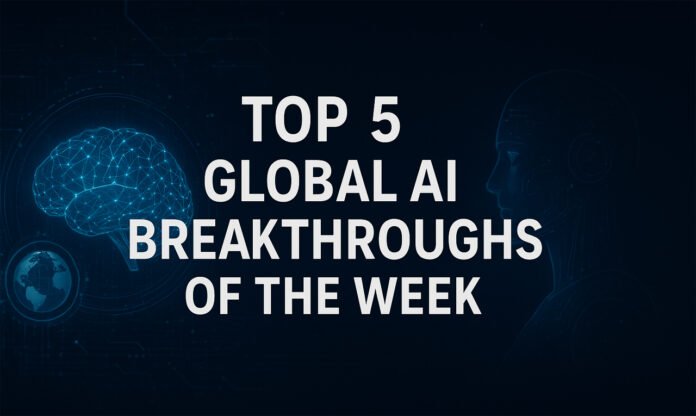A Week That Redefined AI
Artificial Intelligence continues to dominate global innovation headlines — and this week proved just how rapidly the technology is evolving. From OpenAI’s latest multimodal GPT rollout to India’s national AI mission entering its final implementation phase, AI is transforming everything — from communication to science itself.
Tech giants and governments alike are racing to lead the next generation of machine learning, automation, and ethical AI governance.
Here’s your exclusive roundup of the Top 5 Global AI Breakthroughs of the Week (as of October 30, 2025) — curated for readers who think beyond the algorithm.
🧠 1. OpenAI’s GPT-5.1 Multimodal Upgrade Takes Center Stage
OpenAI has officially rolled out GPT-5.1, a refined upgrade to its multimodal model capable of seamlessly integrating text, image, voice, and video inputs.
According to internal developer notes and early partner feedback, GPT-5.1 delivers a 60% improvement in contextual accuracy and introduces real-time web reasoning, allowing users to pull fresh verified data into conversations instantly.
“The next phase of AI is not just about intelligence — it’s about intuition,” said OpenAI CTO Mira Murati in a recent post.
This version is being tested across enterprise clients in education, law, journalism, and design — marking a massive leap toward adaptive AI systems that think more like humans.
⚛️ 2. DeepMind Unveils Quantum AI Model for Drug Discovery
Google DeepMind announced its most ambitious project yet — “Project Synapse”, a quantum-enhanced AI framework designed to accelerate drug discovery and protein mapping.
By integrating quantum computing power with DeepMind’s proven AlphaFold technology, the system can simulate molecular interactions up to 1,000 times faster than traditional AI models.
This development could revolutionize biotech, medicine, and nanomaterials — industries where simulation time often dictates innovation speed.
“Quantum AI could cut years of research down to months,” said Dr. Demis Hassabis, CEO of DeepMind.
🌐 3. Meta Introduces “AI Studio” for Creators and Small Businesses
Meta (formerly Facebook) has entered the AI productivity arena with AI Studio, a suite that allows small businesses and creators to train their own custom AI agents for marketing, design, and social engagement.
The system is powered by LLaMA 4, Meta’s open-source large language model, and integrates directly with Instagram and WhatsApp Business.
Features include:
Automated caption generation & ad optimization
Custom chatbots for e-commerce stores
Image-to-reel transformation tools for creators
This launch cements Meta’s shift from a social media company to an AI-powered creative platform.
🇮🇳 4. IndiaAI Mission Enters Implementation Phase
India’s government-backed IndiaAI Mission has officially moved into its execution stage, with the Ministry of Electronics & IT (MeitY) announcing a ₹10,000 crore (≈ $1.2 billion) national framework to scale AI infrastructure, ethics, and talent development.
Key pillars include:
IndiaAI Compute Platform: National AI supercomputing network
IndiaAI Datasets: Open public dataset ecosystem
Responsible AI Policy: Ethical and legal governance model
AI Innovation Hubs: Incubators in Bengaluru, Hyderabad, and Pune
“India’s goal is to lead in inclusive, ethical AI that empowers citizens and startups alike,” said Union Minister Ashwini Vaishnaw during the announcement.
This initiative positions India as Asia’s rising AI powerhouse, competing with the U.S. and China in data-driven innovation.
🧩 5. NVIDIA Launches “Helios” — The Next-Gen AI Superchip
NVIDIA unveiled its Helios AI chip — a breakthrough in computational architecture that delivers five times the energy efficiency and triple the processing power of the current H100 GPU.
Designed for data centers and enterprise-scale AI deployment, Helios integrates real-time neural feedback systems, optimizing power use based on model demand.
“We’re engineering hardware that thinks smarter, not just faster,” said Jensen Huang, CEO of NVIDIA.
The chip is expected to drive the next wave of AI training clusters, especially in autonomous systems, finance, and medical imaging.
🌎 The Bigger Picture: AI’s Global Convergence
This week’s developments underscore a clear reality — AI is no longer confined to labs or research papers. It’s becoming an operational backbone for global industry and governance.
OpenAI is pushing boundaries of natural human-AI interaction.
DeepMind is merging quantum and biology.
Meta is democratizing creative AI.
India is building national-scale infrastructure.
NVIDIA is setting hardware standards for AI’s future.
The world is witnessing a multi-front evolution — one where AI is as fundamental as electricity once was.
🧭 Conclusion: The Age of “Collaborative Intelligence”
As these innovations converge, the narrative is shifting from Artificial Intelligence to Collaborative Intelligence — where humans and machines evolve together.
“The real promise of AI lies not in replacing people, but in amplifying what we can do,” wrote Dr. Fei-Fei Li, Stanford AI pioneer.
From quantum algorithms to generative storytelling, this week’s breakthroughs mark the dawn of a new cognitive revolution.
And the best part?
We’re just getting started.
















